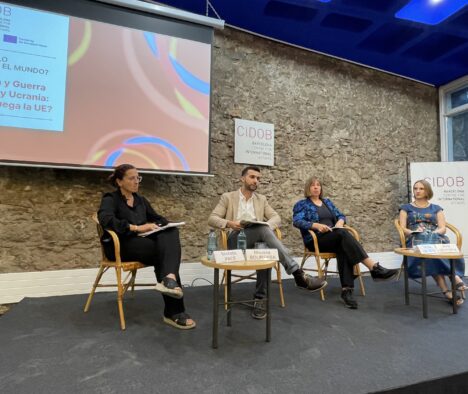📆 A panel discussion titled “Democracy and War in Palestine and Ukraine: What Role for the European Union?” featuring Anna Osypchuk, Ph.D., Director for Research at the School for Policy Analysis and Associate Professor of Sociology at National University of Kyiv-Mohyla Academy (Ukraine) was held at CIDOB (Barcelona Centre for International Affairs) in Barcelona, Spain.
The event was part of the CIDOB project “What’s Happening in the World?” and featured Andrea Gawrich, Professor of Political Science at Justus Liebig University (Germany) and SHAPEDEM-EU Scientific Coordinator; Karim Makdisi, Politics at the American University of Beirut (Lebanon); and Michelle Pace, Professor in Global Studies at Roskilde University. Moussa Bourekba, Research Fellow at CIDOB, moderated the discussion.
🔹The discussion highlighted recent criticisms regarding the EU not holding Israel accountable for alleged war crimes while it promptly identified Russia as the aggressor in Ukraine. Today, we would like to share key insights from this discussion.
💭 On Russia’s war in Ukraine, it was noted that having a democratic neighbour is it itself a threat to Putin. Also, many Russians claim that this is not their war and that they can’t do anything about the war, which contradicts democratic values.
In the context of the Middle East, it was observed that even peaceful pro-Palestine rallies do not always receive support from local authorities and police in Europe. This lack of facilitation could undermine democracy, as Palestine is a significant issue for some people’s heritage.
📍The Horizon Europe SHAPEDEM-EU findings suggest that insufficient support for democracy in some of these regions and ignoring the roots of conflicts have led to violations of international law, making the EU’s actions appear unfair to certain communities.
❗️The war between Russia and Ukraine was described as a crime not only against Ukrainians but also against colonised and indigenous peoples in Russia, particularly as they are bearing the heavy costs of military mobilisation.
Finally, the participants noted that the EU cannot be regarded as a unitary political actor as it comprises different institutions and as the EU member states sometimes have differing interests.
🔗Watch the panel discussion: https://lnkd.in/e_a_qY3K

